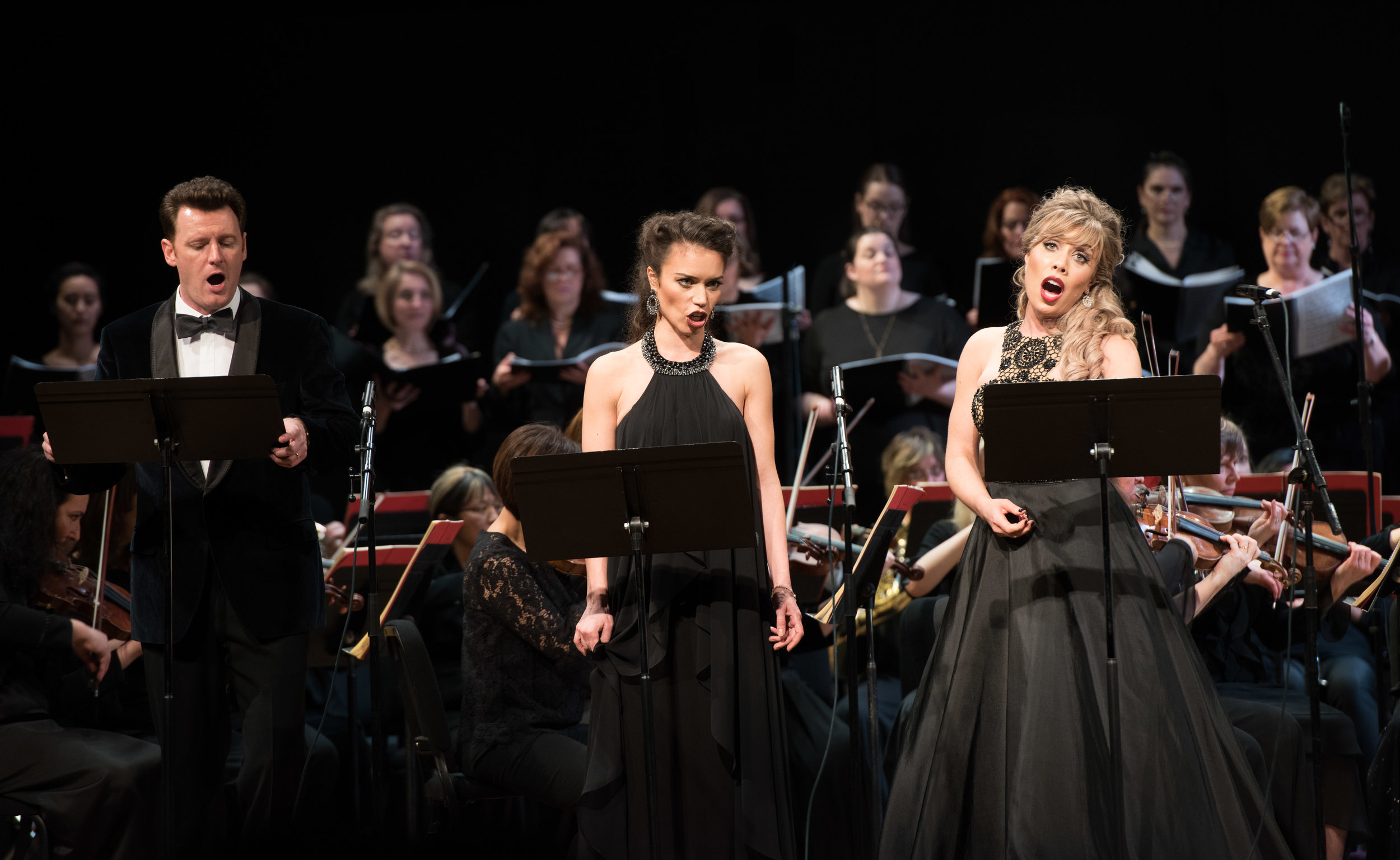Conductor Antony Walker in his Q&A with OperaGene recommended against listening to recordings to prepare for attendance at Washington Concert Opera’s Maria di Rohan. He believed his cast of singers would rise above the level of available recordings, and he hoped the audience would come with fresh ears. I have not listened to all of the recordings, but Marina Costa-Jackson, Norman Reinhardt, Ginger Costa-Jackson, and Lester Lynch made a strong argument to support his contention. Those of us who were there had the privilege of seeing it live, which takes the pleasure to another level. However, you will still be able to get a taste of this scintillating performance in recorded form. Microphones were present recording the event for later broadcast on radio, WETA-FM.
Norman Reinhardt, Ginger Costa-Jackson, and Marina Costa-Jackson. Photo by Don Lassell; courtesy of Washington Concert Opera.
Washington Concert Opera’s motto is ‘it’s all about the music’, which is true for the performers and mostly true for the audience. However, it would be a mistake to underplay the visual appeal of concert opera. The conductor and orchestra are on the stage with the singers in full view, as is the chorus. It is hard to imagine a more involved, interactive conductor that Antony Walker. Physical communication from Conductor Walker to the orchestra might give someone trained in music a sense of the piece even if they could not hear the music. The audience also gets to watch the cues exchanged between conductor and singers. Additionally, the singers are singing in character though dressed in smart-looking tuxedos and gorgeous evening dresses; you can see the emotions on their faces and gestures between characters. I also find it fascinating to watch the orchestra as an instrument solos, or as the different sections of the orchestra come to life, and the interplay of sections with each other. And Donizetti’s music is exciting to hear, especially played live by a talented conductor, orchestra, and chorus.
The Costa-Jackson sisters as Marina enters and Ginger exits the stage, in character and as sisters, and far right is Norman Reinhardt. Photo by Don Lassell; courtesy of Washington Concert Opera.
Maria di Rohan has a complicated plot (see OperaGene's preview, Part I) that revolves around the 1) Countess Maria; 2) a secret love of hers, the Count Chalais; 3) an unwanted suitor, courtier Gondi; and 4) an unwanted husband, the Duke Chevreuse. Their interactions are played out against a backdrop of the Paris court in the late seventeenth century, in the time of Cardinal Richelieu and dangerous court intrigue. It does not end well for the man she loves or herself. The version of Maria di Rohan selected by Mr. Walker, who is also WCO’s Artistic Director was the Paris 1843 version, which expands and turns the role of Gondi into a pants role. The Costa-Jackson sisters, coloratura soprano Marina, who sang the role of Maria, and mezzo-soprano Ginger, who sang the smaller role of Gondi, possess the goods and deliver with both singing and acting as well as Conductor Walker could have asked. Both have strong beautiful voices and bring excitement to the stage. Marina several times hit high notes that brought applause from an already enthusiastic crowd, and Ginger also sang beautifully and showed a natural stage presence; she possesses a certain fire that obviously connected with the audience. Anyone who heard them Sunday evening will want to hear them again; I certainly hope they will be in the DC area again, and soon. Tenor Norman Reinhardt’s voice did not demonstrate the power of his co-stars, but he has a lovely voice and sang with a beauty and depth of feeling, at times seeming to caress phrases, that won me over completely. Lester Lynch, however, can push back the walls with his strong, colorful baritone and matched his colleagues, emotion for emotion. Mr. Lynch and Marina Costa-Jackson had the opportunities with arias in Act III to show off their virtuosity and vocal fireworks, and they rose to the occasion. Capable supporting performances were supplied by Timothy Bruno, Efrain Solis, Adam Caughey, and Andrew Bawden. The substantial chorus that participated, mainly in Act I and the conclusion, excelled, especially in creating some powerful moments when all singers, soloists and the chorus sang together. Maria di Rohan, especially in Acts I and II, focused on duets and other ensemble pieces; these groupings were uniformly excellent. Overall, this cast seemed to stimulate each other, which brought additional excitement to the performance.
Norman Reinhardt, Ginger Costa-Jackson, Marina Costa-Jackson, Antony Walker, Lester Lynch, Efrain Solis, and the Washington Concert Orchestra. Photo by Don Lassell; courtesy of Washington Concert Opera.
Experts can argue whether this late opera by Donizetti is a true masterpiece, as Maestro Walker contends, but for an evening’s operatic entertainment for an opera fan, it was excellent. If I were to revise Mr. Donizetti’s and Maestro Walker's recipe for this performance, I might only add a touch more spice, perhaps a little more Ginger.
The Fan Experience: Washington Concert Opera's next season was announced prior to the start of Maria di Rohan and the announced cast for the coming season is exciting and familiar to Washington DC fans (note that the April 2019 performance will be on a Friday; and subscriptions go on sale in April 2019):
Sunday, November 18, 2018 - Sapho by Charles Gounod, featuring Kate Lindsey and Addison Marlor
Friday, April 5, 2019 - Zelmira by Gioachino Rossini, featuring Silvia Tro Santafe and Lawrence Brownlee



